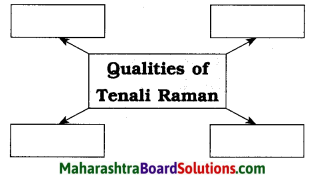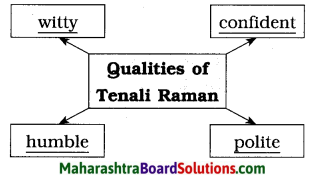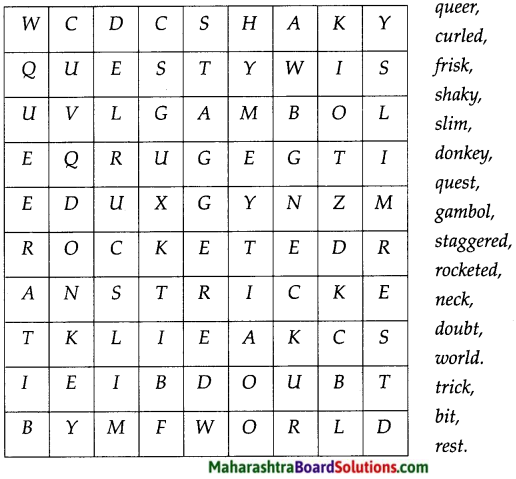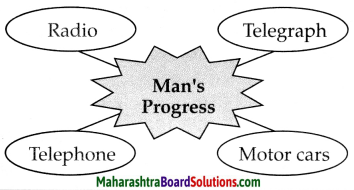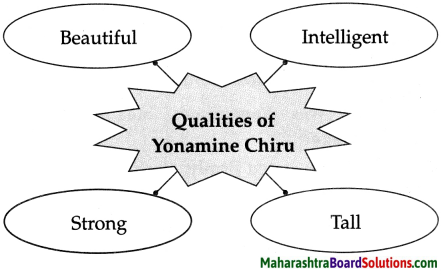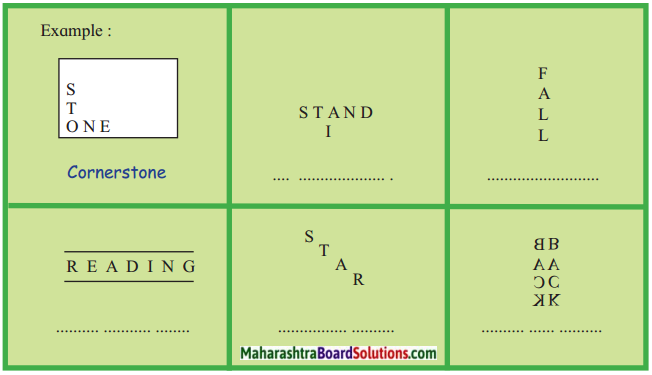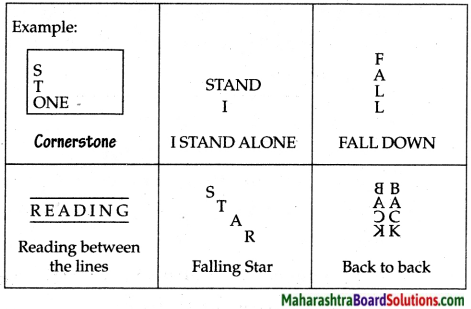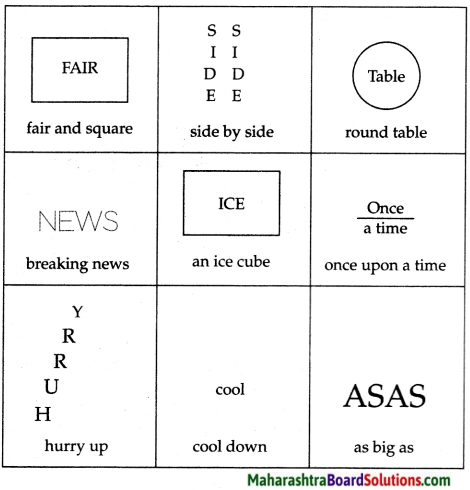Balbharti Maharashtra State Board Class 8 English Solutions Chapter 4.4 Ramanujan Notes, Textbook Exercise Important Questions, and Answers.
Maharashtra State Board Class 8 English Solutions Chapter 4.4 Ramanujan
Class 8 English Chapter 4.4 RamanujanTextbook Questions and Answers
Warming Up:
1. Discuss orally in your class:
In what subjects is knowledge of mathematics used, at school level and college university level. Name them.
Did you know maths is used in music and poetry also? Can you tell me how?
Answer:
(Points: knowledge of maths is used in science, physics, chemistry, economics, accountancy, etc. Poetry-rhymes, rhythm; music-beat, rhythm, etc.)
2. Use the letters in the word MATHEMATICIAN to make 4 letters 5 letter and 6 or more letter words, within a time limit fixed by your teacher.
Answer:
Mathematician: cinema, anthem, thematic, machine, attach, match, meant, mice, item, mime, hate, heat, them, team, etc.

3. Sentences can be classified into three types – Simple, Complex and Compound.
A Simple Sentence is one that has only one Subject and one Predicate.
It has only one Finite verb.
For example, She went home.
In the morning, near my school, I saw a snake.
A Complex Sentence consists of one Main Clause and one or more
Dependent or Subordinate Clauses.
For example, She went home, after school was over.
The boys found the book which had been lost.
A Compound Sentence consists of two or more Independent or
Co-ordinate Clauses. They are joined by Co-ordinators.
For example: and, but, so, or, for etc.
a. He finished his work and he left his office.
b. He is poor but he is honest.
From lesson 4.2 pick out one example of each of the following.
(i) Simple Sentence: ……………
Answer:
Modern techniques are used nowadays for anaesthesia.
(ii) Complex Sentence: …………..
Answer:
Today, if you need to have heart surgery, you can choose from many fine doctors.
(iii) Compound Sentence: ……………
Answer:
Over the years now, revolutionary steps have been taken in different types of complicated surgery and these have made such operations successful.

1. A. Use the following words/phrases to make sentences of your own:
Question 1.
enthusiasm
Answer:
The hikers set off on the hike with great enthusiasm.
Question 2.
loped off
Answer:
The deer loped off easily after being freed from the trap.
Question 3.
fraud
Answer:
The doctor was arrested by the police for being a fraud.
Question 4.
clarity
Answer:
The teacher told the student that there was no clarity in her answers.
Question 5.
to come
Answer:
The minister refused to come to the party unless he was provided conveyance.
Question 6.
amiable
Answer:
The Principal was happy that the new teacher was an amiable person.

Question 7.
to terms with
Answer:
The doctor advised the woman to come to terms with her illness,
Question 8.
conveyance
Answer:
The minister refused to come to the party unless he was provided conveyance.
1. B. The following words can be used us Nouns us well us Verbs:
(visit / honour / report / watch / form / surprise)
Make pairs of sentences of your own using them us u Noun in one and as a Verb in the other.
For example:
(i) She gave a smile – Noun.
(ii) Babies smile when they see their mother – Verb.
Answer:
(1) visit:
(i) My grandmother came over for a visit yesterday, (noun)
(ii) “We must visit the zoo when we go to Hyderabad,” said Meera. (verb)
(2) honour:
(i) It was an honour to have such a great scientist visit our college, (noun)
(ii) “Let us honour those who have laid down their lives for the country,” said the minister, (verb)
(3) report:
The class had to hand in their project reports by the end of the week. (noun)
(ii) The witness reported all that he had seen to the lawyer, (verb)
(4) Watch:
(i) Suman lost her new watch while travelling by train, (noun)
(ii) “Watch the house to see if the thief returns,” ordered the inspector, (verb)

(5) form:
(i) The boy’s admission form was rejected by the college as it was incomplete. (noun)
(ii) We formed our own impression of the new corporator, (verb)
(6) surprise:
(i) “There is a surprise for you outside your door,” said my friend. (noun)
(ii) The villagers surprised thief 1 when he was sleeping and caught him. (verb)
2. Say why:
Question 1.
Ramanujan’s letter bored and irritated Hardy at first.
Answer:
Ramanujan’s letter was written in halting English and signed by a person unknown to Hardy. The script appeared to consist of theorems, most of them wild or fantastic-looking. Some of them though well-known were laid out as though they were original. There were no proofs of any kind. It seemed to be a kind of fraud, and hence bored and irritated Hardy.
Question 2.
Hardy invited Littlewood for a discussion.
Answer:
Hardy could not get the Indian manuscript out of his mind. It had wild theorems he had never seen before or imagined. He wondered if it was an unknown mathematician of genius. He had another look at the script and then invited Littlewood for a discussion to clarify his doubts.
Question 3.
mother agreed to send Ramanujan to England.
Answer:
Ramanujan’s mother had a dream in which she saw her son seated in a big hall among a group of Europeans and the goddess of Namakkal had commanded her not to stand in the way of her son fulfilling his life’s purpose. Hence, obeying the command of the goddess of Namakkal, mother agreed to send Ramanujan to England.

Question 4.
Hardy and Ramanujan could not talk freely with each other.
Answer:
Ramanujan was an untrained genius. There was a big difference between Ramanujan’s and Hardy’s education. Ramanujan knew nothing of modern rigour; he did not know what proof was and Hardy was obliged to teach him some formal mathematics. He was sometimes confused with Hardy’s conversation when it was outside mathematics. Due to all these reasons, Hardy and Ramanujan could not; talk freely with each other.
Question 5.
Ramanujan had to be hospitalized.
Answer:
Ramanujan had to be hospitalized because he was ill. He later died of tuberculosis.
Question 6.
Ramanujan found the number 1729 very interesting.
Answer:
Ramanujan found the number 1729 very interesting because it is the smallest number expressible as the sum of two cubes in two different ways.
3. Read the text and enlist the achievements and honours of Ramanujan, received in England.
Answer:
Ramanujan’s achievements and honour, received in England:
- The Royal Society elected him a Fellow at the age of thirty (which, even for a mathematician, is very young)
- Trinity College elected him a Fellow in the same year.
- Ramanujan was the first Indian to be given either of these distinctions.
4. Voice – Active and Passive
The form of a verb shows whether the doer of an action is in the Subject (Active voice) or the Subject has an action done to it (Passive voice).
For example, The thief stole the jewels. (Active voice).
The jewels were stolen by the thief. (Passive voice)
Note: While changing from Active to Passive voice, the verb form includes be + past participle.
In a sentence, when the doer of an action is significant, we use Active voice. In Passive voice, the doer of an action may not be mentioned.
For example, The thief was caught. (by the police)

(A) Underline the verbs in the following sentences and state whether the sentences are in Active or Passive voice:
Question a.
England gave Ramanujan great honours.
Answer:
England gave Ramanujan great honours. (Active)
Question b.
A large untidy envelope was decorated with Indian stumps.
Answer:
A large untidy envelope was decorated with Indian stumps. (Passive)
Question c.
The timetable was not altered.
Answer:
The timetable was not altered. (Passive)
Question d.
She saw her son in a big hail.
Answer:
She saw her son in a big hail. (Active)
Question e.
Hardy corrected his statement.
Answer:
Hardy corrected his statement. (Active)
Question f.
Ramanujan was brought to England.
Answer:
Ramanujan was brought to England. (Passive)

(B) Change the voice in the following sentences:
Question a.
Hardy taught Ramanujan.
Answer:
Ramanujan was taught by Hardy.
Question b.
He knew nothing of the modern rigour.
Answer:
Nothing of the modern rigour was known by him.
Question c.
Sheets of paper were found in it, by Hardy.
Answer:
Hardy found sheets of paper in it.
Question d.
Hardy was bored by that manuscript.
Answer:
That manuscript bored Hardy.
Question e.
Trinity supported unorthodox talent.
Answer:
The unorthodox talent was supported by Trinity.

Question f.
He could not break the ban.
Answer:
The ban could not be broken by him.
5. Identify whether the following are Simple, Complex and Compound sentences:
Question a.
When he opened it, he found sheets of paper.
Answer:
Complex
Question b.
He glanced at a letter.
Answer:
Simple
Question c.
Hardy was not only bored but he was also irritated.
Answer:
Compound
Question d.
Ramanujan turned out to be a poor clerk.
Answer:
Simple
Question e.
If Ramanujan had been better educated, he would hove been even more wonderful than he was.
Answer:
Complex

Question f.
Ramanujan was self-taught: he knew nothing of the modern rigour.
Answer:
Compound
6. Interview Question:
A brilliant student from your school has on a Mathematics Quiz at the National Level.
Frame questions to ¡ntervie him / her when the school felicitates him / her. Follow the steps given below.
- Greeting
- Introduction of the interviewee and achievements.
- 2 or 3 questions about growing years.
- 4 to 6 questions about the achievements.
- 2 or 3 questions about future plans and prospects.
- Expression of thanks and good wishes.
Answer:
(1) Good morning, Rachana. First of all, let me offer you my Congratulations on winning the Mathematics Quiz, and that too, at the National Level. May I ask you a few questions about your achievement?
(2) Did you have great interest in mathematics in the early years of your childhood?
(3) How did you develop this interest?
(4) How long did you prepare yourself before participating in this Quiz?
(5) Who helped you and guided you?
(6) Who encouraged you or motivated you at that stage?
(7) How did you feel when you were actually answering the questions?
(8) What is the next step from here?
(9) Do you plan to make a career in mathematics?
(10) Any message to others interested in mathematics?
(11) Thank you, and all the best for your future. Goodbye.
7. Summary:
- Read the first three paragraphs on Page 92. (From One morning upto ………… a discussion after hail)
- Re-read the same noting down only Important points.
- RewrIte the Important points In your own simple language, In you notebook.
- Make certain that your summary Is less than half the length of the original passage.
Answer:
The Manuscript
One morning in 1913, Hardy received an envelope from India. It contained many lines of symbols, written in non- English script. The letter with it, written in halting English and signed by an unknown Indian, wanted Hardy’s opinion on the mathematical discoveries enclosed. These were only some known and unknown theorems, without any proofs. Hardy, bored and irritated, put the manuscript aside and went to play tennis. However, his pleasure in his game was interrupted by; the thought of the Indian manuscript with the wild theorems he had left behind. He
wondered if the man was a genius. When he returned to his room, he took another look at the script. Then he sent word to Littlewood that they must have a discussion after hall.

Class 8 English Chapter 4.4 Ramanujan Additional Important Questions and Answers
Complete the following:
Question 1.
Hardy could not enjoy his game because ________.
Answer:
he kept thinking of the Indian manuscript that he had received that morning.
Question 2.
The manuscript contained _______.
Answer:
wild and fantastic-looking theorems and lines and lines of symbols in a non-English script.
Question 3.
The famous mathematicians mentioned in this extract are ______.
Answer:
Hardy and Littlewood.
Question 4.
The two English mathematicians realized by midnight _______.
Answer:
that the writer of the manuscripts was a man of genius
Question 5.
The famous mathematicians mentioned in this extract are _______.
Answer:
Hardy, Ramanujan, Gauss, Euler and Kapitsa

Question 6.
The number 1729 is exceptional because _________.
Answer:
it is the smallest number expressible as the sum of two cubes in two different ways
Question 7.
The famous mathematicians mentioned in this extract are ______.
Answer:
Galois, Abel, and Riemann, in addition to Hardy and Ramanujan
Answer the following:
Question 1.
Hardy invited Littlewood for a discussion.
Answer:
Hardy could not get the Indian manuscript out of his mind. It had wild theorems he had never seen before or imagined. He wondered if it was an unknown mathematician of genius. He had another look at the script and then invited Littlewood for a discussion to clarify his doubts.
Question 2.
What qualities of Ramanujan does this extract bring out?
Answer:
This extract brings out Ramanujan’s passion for mathematics, his courage, and perseverance in sending his manuscript to a strange person across the seas, his efforts to put forward his ideas in spite of a lack of education, and his intelligence.
Question 3.
What were the two drawbacks of Ramanujan’s career?
Answer:
The two drawbacks in Ramanujan’s career were the defects in his education and that he had come on the scene too late in the line of mathematical history.
Question 4.
What superstition did Ramanujan’s mother believe in?
Answer:
Ramanujan’s mother believed in the superstition that she had to obey the commands given to her in her dream by the goddess of Namakkal and that whatever is seen in dreams comes true.

Question 5.
What surprised everyone one morning?
Answer:
One morning, Ramanujan’s mother said that she had a dream the previous night, in which she saw her son seated in a big hall among a group of Europeans. The goddess of Namakkal had commanded her not to stand in the way of her son fulfilling his life’s purpose. This statement, coming from a woman who was very strict about her religious observances, surprised everyone.
Question 6.
Say why mother agreed to send Ramanujan to England.
Answer:
Ramanujan’s mother had a dream in which she saw her son seated in a big hall among a group of Europeans and the goddess of Namakkal had commanded her not to stand in the way of her son fulfilling his life’s purpose. Hence, obeying the command of the goddess of Namakkal, mother agreed to send Ramanujan to England.
Question 7.
Hardy calls teaching Ramanujan an unusual experience.
Answer:
Ramanujan was an untrained genius. Yet, because of the defects in his education, Hardy had to teach him some formal mathematics as though Ramanuja was a scholarship candidate at Winchester. Hardy found it strange teaching modern mathematics to someone who had the deepest insight but who had literally never heard most of it. Hence he says that teaching Ramanujan was an unusual experience.
Underline the finite verbs in the following sentence:
She had a dream the previous night, in which she saw her son seated in a big hall among a group of Europeans and the goddess of Namakkal had commanded her not to stand in the way of her son fulfilling his life’s purpose.
Answer:
She had a dream the previous night, in which she saw her son seated in a big hall among a group of Europeans and the goddess of Namakkal had commanded her not to stand in the way of her son fulfilling his life’s purpose.
Personal Response:
Question 1.
Do you believe in superstitions?
Answer:
I don’t believe in silly superstitions: like black cats crossing the path, walking under a ladder, etc. But I believe in God and that good things happen to good people. I also believe that ‘God helps those who help themselves’. We must work hard if we want something, and not just sit back and expect God and ‘luck’ to do things for us.
Question 2.
Ramanujan did not have a proper formal education. Yet he became a famous mathematician. Does this mean that proper education is not necessary?
Answer:
I think Ramanujan’s case was a very rare case, where he became famous even though there were so many defects in his education. This was because he was very highly talented. However, if he had received a proper education, he would probably have done much, much more, and contributed more in the field of maths. A proper education always helps, and one must always go for it.

Question 3.
In the earlier days, people used to die of illnesses like tuberculosis and pneumonia. Do you think that is still the case?
Answer:
Though these diseases are still prevalent, the rate of cure is high, and the percentage of people dying from them has gone down. Different medicines have – been found for them. Today people die of cardiac problems, cancer, etc.
Write if the following statements are True or False:
Question 1.
Ramanujan was a bad-tempered person.
Answer:
False
Question 2.
Hardy thought that Ramanujan was an untrained genius.
Answer:
True
Question 3.
Ramanujan did not get admission to Madras University.
Answer:
True

Question 4.
Ramanujan was sometimes confused with Hardy’s conversation.
Answer:
True
Do as directed:
Question 1.
Pick out two compound words from the lesson.
Answer:
timetable, superhuman
Question 2.
Make a word pyramid of at least four words beginning with U.
Answer:
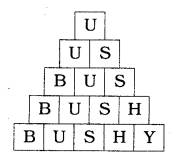
Question 3.
Give the noun forms of:
amiable, fulfilling
Answer:
amiability, fulfillment
Question 4.
Find out four hidden words from the given word: miserably (Each word should have at least 4 letters.)
Answer:
miserably: miser, able, miserly, bleary

Question 5.
Use the following word and its homophone in two separate sentences: sent
Answer:
(i) Harsha sent the little boy home immediately.
(ii) The scent of the jasmine flowers was simply wonderful.
Question 6.
Rewrite as a negative sentence:
It seemed impossible that he could break the ban and cross the water.
Answer:
It did not seem possible that he could break the ban and cross the water.
Question 7.
Underline the adjectives in the following sentence:
He seems to have listened with a patient smile on his good, friendly, homely face.
Answer:
He seems to have listened with a patient smile on his good, friendly, homely, face.
Question 8.
Say whether the sentence is Simple, Compound, or Complex:
If it had been summer, he would have walked down to Fenner’s to watch cricket.
Answer:
Complex
Question 9.
Change the voice:
They needed a certain amount of help from a superhuman agency.
Answer:
A certain amount of help was needed from a superhuman agency (by them).

Question 10.
Rewrite using the underlined word as a verb:
He sent word to Littlewood that they must have a discussion.
Answer:
He sent word to Littlewood that they must discuss.
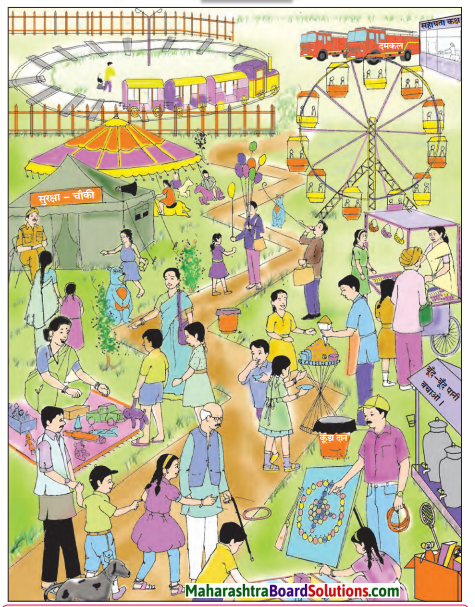
![]()
![]()
![]()
![]()
